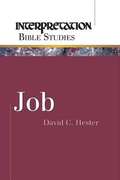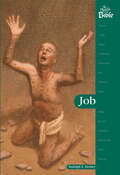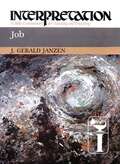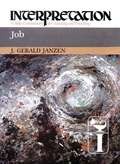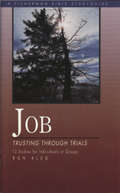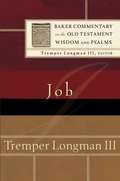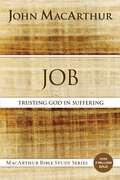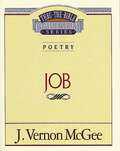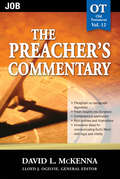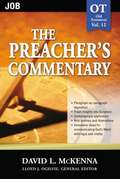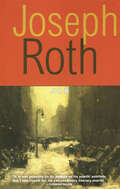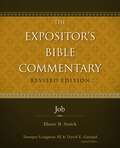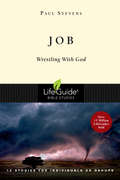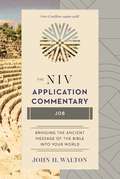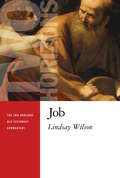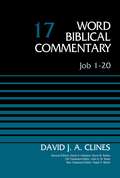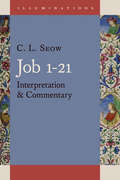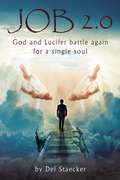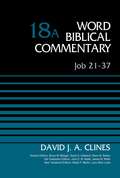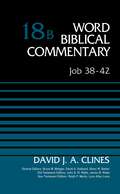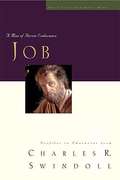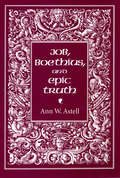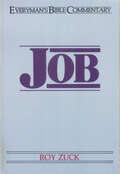- Table View
- List View
Job
by David C. HesterIn this study, noted Old Testament scholar and Christian educator David Hester focuses on the difficult questions raised in Job: where is God in the worst moments of our emptiness? What are we to do when experience casts doubt on what we have always believed? Where in the world is justice? The author brings to this writing his own experience of suffering. His touching honesty provides a moving connection between the ancient text and the world of today, inviting us to join in Job's search for hope and healing. Interpretation Bible Studies (IBS) offers solid biblical content in a creative study format. Forged in the tradition of the celebrated Interpretation commentary series, IBS makes the same depth of biblical insight available in a dynamic, flexible, and user-friendly resource. Designed for adults and older youth, IBS can be used in small groups, in church school classes, in large group presentations, or in personal study.
Job (The People's Bible)
by Rudolph E HonseyWhat is the book of Job about? Who is Job in the Bible?Job is a literary masterpiece that tells the story of a man described as “blameless and upright” who “feared God and shunned evil.” Yet Job suffered horribly. He lost possessions, his health, even his dearly loved sons and daughters. In this book, God reminds believers that he sometimes sends suffering to test them. His faithful people patiently endure each trial and trust that God’s ways are far beyond the human ability to understand.Want to learn more? If you’re wondering what the book of Job is all about, this helpful resource is for you!Job is a reliable Bible commentary. It’s down to earth, clearly written, easy to read and understand, and filled with practical and modern applications to Scripture.It also includes the complete text of the book of Job from the NIV Bible. The Christ-centered commentaries following the Scripture sections contain explanations of the text, historical background, illustrations, and archaeological information. Job is a great resource for personal or group study!This book is a part of The People’s Bible series from Northwestern Publishing House.
Job
by J. Gerald JanzenIn this volume, J. Gerald Janzen examines the text of the book of Job as a literary text within the context of the history of the religion of Israel and within the broader context of the universal human condition. He approaches the basic character of the book from a literary perspective which enables him to identify human existence as exemplified in Job and to expound on the mystery of good and evil, which gives human existence its experiential texture and which together drive humans to ask the same kind of questions asked by Job. This is the first full-length commentary to present Job systematically and literarily. Interpretation: A Bible Commentary for Teaching and Preaching is a distinctive resource for those who interpret the Bible in the church. Planned and written specifically for teaching and preaching needs, this critically acclaimed biblical commentary is a major contribution to scholarship and ministry.
Job: Interpretation (A Bible Commentary for Teaching and Preaching)
by J. Gerald JanzenIn this volume, J. Gerald Janzen examines the text of the book of Job as a literary text within the context of the history of the religion of Israel and within the broader context of the universal human condition. He approaches the basic character of the book from a literary perspective which enables him to identify human existence as exemplified in Job and to expound on the mystery of good and evil, which gives human existence its experiential texture and which together drive humans to ask the same kind of questions asked by Job. This is the first full-length commentary to present Job systematically and literarily.
Job: Trusting Through Trials (Fisherman Bible Studyguide Series)
by Ronald KlugWhy Do Good People Suffer? Why, God? why has this happened to me? How can I make sense out of my life? The book of Job wrestles with the deep personal questions that confront us as we face illness, loss, disappointment, suffering and death. And it calls us to faith in the God of strength and love who cares for us in the midst of our suffering.
Job
by Tremper Longman IIIA respected Old Testament scholar provides an exegetical commentary on Job with theological insights for pastors, professors, and all serious students of the Bible.
Job (MacArthur Bible Studies)
by John F. MacArthurThe events that occur in the book of Job present readers with a profound question: "Why do the righteous suffer?" Although a direct answer to this question seems important, the book of Job does not set forth such a response. Job never learned the reasons for his suffering. In fact, when God finally confronted Job, he could only put his hand over his mouth and say nothing. His silence underscores the importance of trusting God's purposes in the midst of suffering, because suffering—like all other human experiences—is directed by perfect divine wisdom.In this study, pastor John MacArthur will guide you through an in-depth look at the defining themes and interpretative challenges in Job. Studies include close-up examinations of doctrinal themes such as God's Justice and "A Discourse on Human Frailty."—ABOUT THE SERIES—The MacArthur Bible Study series is designed to help you study the Word of God with guidance from widely respected pastor and author John MacArthur. Each guide provides intriguing examinations of the whole of Scripture by examining its parts and incorporates:Extensive, but straight-forward commentary on the text.Detailed observations on overriding themes, timelines, history, and context.Word and phrase studies to help you unlock the broader meaning and apply it to your life.Probing, interactive questions with plenty of space to write down your response and thoughts.
Job: Poetry (Thru the Bible #16)
by J. Vernon McgeeRadio messages from J. Vernon McGee delighted and enthralled listeners for years with simple, straightforward language and clear understanding of the Scripture. Now enjoy his personable, yet scholarly, style in a 60-volume set of commentaries that takes you from Genesis to Revelation with new understanding and insight. Each volume includes introductory sections, detailed outlines and a thorough, paragraph-by-paragraph discussion of the text. A great choice for pastors - and even better choice for the average Bible reader and student! Very affordable in a size that can go anywhere, it's available as a complete 60-volume series, in Old Testament or New Testament sets, or individually.
Job (The Preacher's Commentary)
by David MckennaGeneral editor Lloyd J. Ogilvie brings together a team of skilled and exceptional communicators to blend sound scholarship with life-related illustrations.The design for the Preacher's Commentary gives the reader an overall outline of each book of the Bible. Following the introduction, which reveals the author's approach and salient background on the book, each chapter of the commentary provides the Scripture to be exposited. The New King James Bible has been chosen for the Preacher's Commentary because it combines with integrity the beauty of language, underlying Hebrew and Greek textual basis, and thought-flow of the 1611 King James Version, while replacing obsolete verb forms and other archaisms with their everyday contemporary counterparts for greater readability. Reverence for God is preserved in the capitalization of all pronouns referring to the Father, Son, or Holy Spirit. Readers who are more comfortable with another translation can readily find the parallel passage by means of the chapter and verse reference at the end of each passage being exposited. The paragraphs of exposition combine fresh insights to the Scripture, application, rich illustrative material, and innovative ways of utilizing the vibrant truth for his or her own life and for the challenge of communicating it with vigor and vitality.
Job (Preacher's Commentary, Volume #12)
by David L. MckennaGeneral editor Lloyd J. Ogilvie brings together a team of skilled and exceptional communicators to blend sound scholarship with life-related illustrations. The design for the Preacher's Commentary gives the reader an overall outline of each book of the Bible. Following the introduction, which reveals the author's approach and salient background on the book, each chapter of the commentary provides the Scripture to be exposited. The New King James Bible has been chosen for the Preacher's Commentary because it combines with integrity the beauty of language, underlying Hebrew and Greek textual basis, and thought-flow of the 1611 King James Version, while replacing obsolete verb forms and other archaisms with their everyday contemporary counterparts for greater readability. Reverence for God is preserved in the capitalization of all pronouns referring to the Father, Son, or Holy Spirit. Readers who are more comfortable with another translation can readily find the parallel passage by means of the chapter and verse reference at the end of each passage being exposited. The paragraphs of exposition combine fresh insights to the Scripture, application, rich illustrative material, and innovative ways of utilizing the vibrant truth for his or her own life and for the challenge of communicating it with vigor and vitality.
Job: The Story of A Simple Man
by Joseph RothAn Orthodox Jew’s faith is tested when he leaves Tsarist Russia for NYC in this retelling of the Book of Job—“inspired in its poetry and its deep insight” (The New York Times).Job is the tale of Mendel Singer, a pious Eastern-European Jew who teaches the Torah to children, and whose faith is tested at every turn. His youngest son seems to be incurably disabled, one of his older sons joins the Russian Army, the other deserts to America, and his daughter is running around with a Cossack. When he flees with his wife and daughter, further blows of fate await him . . . In this modern fable based on the biblical story of Job, Mendel Singer witnesses the collapse of his world, experiences unbearable suffering and loss, and ultimately gives up hope and curses God, only to be saved by a miraculous reversal of fortune.
Job (The Expositor's Bible Commentary)
by Elmer B. SmickContinuing a Gold Medallion Award-winning legacy, the completely revised Expositor's Bible Commentary puts world-class biblical scholarship in your hands.A staple for students, teachers, and pastors worldwide, The Expositor's Bible Commentary (EBC) offers comprehensive yet succinct commentary from scholars committed to the authority of the Holy Scriptures. The EBC uses the New International Version of the Bible, but the contributors work from the original Hebrew and Greek languages and refer to other translations when useful.Each section of the commentary includes:An introduction: background information, a short bibliography, and an outlineAn overview of Scripture to illuminate the big pictureThe complete NIV textExtensive commentaryNotes on textual questions, key words, and conceptsReflections to give expanded thoughts on important issuesThe series features 56 contributors, who:Believe in the divine inspiration, complete trustworthiness, and full authority of the BibleHave demonstrated proficiency in the biblical book that is their specialtyAre committed to the church and the pastoral dimension of biblical interpretationRepresent geographical and denominational diversityUse a balanced and respectful approach toward marked differences of opinionWrite from an evangelical viewpointFor insightful exposition, thoughtful discussion, and ease of use—look no further than The Expositor's Bible Commentary.
Job: Wrestling with God (LifeGuide Bible Studies)
by R. Paul StevensWhy do faithful people suffer? Job wanted to know. So he demanded an answer from God. His friends thought he was crazy, but Job persisted. And, finally, God answered. As Paul Stevens leads you through twelve-session LifeGuide Bible Study, Job's questions and God's answers, you discover comfort, hope and meaning for the suffering in your own life. This revised LifeGuide Bible Study features additional questions for starting group discussions and for meeting God in personal reflection, together with expanded leader's notes and a "Now or Later" section in each study. For over three decades LifeGuide Bible Studies have provided solid biblical content and raised thought-provoking questions���making for a one-of-a-kind Bible study experience for individuals and groups. This series has more than 130 titles on Old and New Testament books, character studies, and topical studies. PDF download with a single-user license; available from InterVarsity Press and other resellers.
Job (The NIV Application Commentary)
by null John H. WaltonThe NIV Application Commentary helps you communicate and apply biblical text effectively in today's context.To bring the ancient messages of the Bible into today's world, each passage is treated in three sections:Original Meaning. Concise exegesis to help readers understand the original meaning of the biblical text in its historical, literary, and cultural context.Bridging Contexts. A bridge between the world of the Bible and the world of today, built by discerning what is timeless in the timely pages of the Bible.Contemporary Significance. This section identifies comparable situations to those faced in the Bible and explores relevant application of the biblical messages. The author alerts the readers of problems they may encounter when seeking to apply the passage and helps them think through the issues involved.This unique, award-winning commentary is the ideal resource for today's preachers, teachers, and serious students of the Bible, giving them the tools, ideas, and insights they need to communicate God's Word with the same powerful impact it had when it was first written.
Job
by Lindsay WilsonIn this commentary Lindsay Wilson shows the book of Job to be a coherent literary work that addresses this question: Is it possible for humans to have genuine faith in God regardless of their circumstances? Wilson argues that Job’s bold, sometimes questioning cries to God are portrayed as legitimate expressions of trust for a righteous person in adversity. Through critical exegesis of the text, Wilson focuses on the message of Job and its implications for practical ministry, examining such key issues as suffering, justice, lament, and faith. He also touches on various pertinent topics in Christian ethics, including individual character, wealth, suicide, and the environment. In a final section Wilson offers guidance on using Job as a resource book for pastoral care and prayer, and he discusses how to teach and preach from the book of Job.
Job 1-20, Volume 17
by David J. Clines David Allen Hubbard Glenn W. Barker John D. Watts Ralph P. MartinThe Word Biblical Commentary delivers the best in biblical scholarship, from the leading scholars of our day who share a commitment to Scripture as divine revelation. This series emphasizes a thorough analysis of textual, linguistic, structural, and theological evidence. The result is judicious and balanced insight into the meanings of the text in the framework of biblical theology. These widely acclaimed commentaries serve as exceptional resources for the professional theologian and instructor, the seminary or university student, the working minister, and everyone concerned with building theological understanding from a solid base of biblical scholarship.Overview of Commentary OrganizationIntroduction—covers issues pertaining to the whole book, including context, date, authorship, composition, interpretive issues, purpose, and theology.Each section of the commentary includes:Pericope Bibliography—a helpful resource containing the most important works that pertain to each particular pericope.Translation—the author’s own translation of the biblical text, reflecting the end result of exegesis and attending to Hebrew and Greek idiomatic usage of words, phrases, and tenses, yet in reasonably good English.Notes—the author’s notes to the translation that address any textual variants, grammatical forms, syntactical constructions, basic meanings of words, and problems of translation.Form/Structure/Setting—a discussion of redaction, genre, sources, and tradition as they concern the origin of the pericope, its canonical form, and its relation to the biblical and extra-biblical contexts in order to illuminate the structure and character of the pericope. Rhetorical or compositional features important to understanding the passage are also introduced here.Comment—verse-by-verse interpretation of the text and dialogue with other interpreters, engaging with current opinion and scholarly research.Explanation—brings together all the results of the discussion in previous sections to expose the meaning and intention of the text at several levels: (1) within the context of the book itself; (2) its meaning in the OT or NT; (3) its place in the entire canon; (4) theological relevance to broader OT or NT issues.General Bibliography—occurring at the end of each volume, this extensive bibliographycontains all sources used anywhere in the commentary.
Job 1 - 21: Interpretation and Commentary
by C. L. SeowThe Hebrew book of Job is by all accounts an exquisite piece of literary art that holds its rightful place among the most outstanding compositions in world literature. Yet it is also widely recognized as an immensely difficult text to understand.In elucidating that ancient text, this inaugural Illuminations commentary by C. L. Seow pays close attention to the reception history of Job, including Jewish, Muslim, Christian, and Western secular interpretations as expressed in theological, philosophical, and literary writings and in the visual and performing arts. Seow offers a primarily literary-theological interpretation of Job, a new translation, and detailed commentary.
Job 2.0: God and Lucifer battle again for a single soul
by Del StaeckerGod and Lucifer are at it again! More than three millennia after their first contest, the creator of the Universe and his highest errant minion are struggling once again over the fate of a single soul. For this battle the center of their attention is not God’s most favored servant. Rather it is an everyday person. What could this rematch mean for human kind when a nobody is in Lucifer’s crosshairs? More importantly, what does it mean for you?JOB 2.0 is an updated retelling of JOB, the oldest book in the Bible. It takes place in modern times, using every-day language and ordinary life situations. Lucifer challenges God to another test of one of God’s faithful. Lucifer chooses Jake (Jacob Osborne Brown, Junior, or JOB II), who loses everything in the course of the challenge. To rid himself of his old life and the values it reflected, Jake has a yard sale, during which his neighbors and friends stop by to provide their insights into why his life fell apart. Through seven conversations, and interjections from God and Lucifer, the characters share insights into the nature of God, the definition of evil, an explanation of sin, the role of choice in one’s life, the recognition of individual responsibility, the sovereignty of God, the importance of faith, the power of prayer, the comfort of faith, and the search for spiritual truth.In the last conversation, Jake has the opportunity to ask God all the questions he wants answered. God provides the understanding Jake seeks, explaining the relationship between God and humans, our purpose, the nature of love, the importance of repentance, and finally, (re)unification with Himself.JOB 2.0 explains our relationship with God in a truly humorous manner yet is not preachy. Instead, it encourages self-examination and rigorous thought while being utterly entertaining. It is perfect for young adults as well as mature readers; it is appropriate for unchurched as well as churched populations; it is perfect for those seeking meaning in their lives as well as those who have defined their spiritual life. It is perfect for gift-giving anytime, but especially for coming-of-age and other life-stage moments, as well as during traditional gift-giving holidays.One reader described it as, “Funny, yet deep and serious. The relationship between God, Job and Lucifer are pure imagination and done so well.” Another reader said, “I love how it manages to offer fresh illumination with Lucifer challenging God and Logic in every conceivable way until we are left to get to the heart of IT ALL. This is great, and a pleasure to read!”
Job 21-37, Volume 18A
by David J. Clines Bruce M. Metzger David Allen Hubbard Glenn W. Barker John D. Watts James W. Watts Ralph P. Martin Lynn Allan LosieThe Word Biblical Commentary delivers the best in biblical scholarship, from the leading scholars of our day who share a commitment to Scripture as divine revelation. This series emphasizes a thorough analysis of textual, linguistic, structural, and theological evidence. The result is judicious and balanced insight into the meanings of the text in the framework of biblical theology. These widely acclaimed commentaries serve as exceptional resources for the professional theologian and instructor, the seminary or university student, the working minister, and everyone concerned with building theological understanding from a solid base of biblical scholarship. <p><p>Overview of Commentary OrganizationIntroduction—covers issues pertaining to the whole book, including context, date, authorship, composition, interpretive issues, purpose, and theology.Each section of the commentary includes:Pericope Bibliography—a helpful resource containing the most important works that pertain to each particular pericope.Translation—the author’s own translation of the biblical text, reflecting the end result of exegesis and attending to Hebrew and Greek idiomatic usage of words, phrases, and tenses, yet in reasonably good English.Notes—the author’s notes to the translation that address any textual variants, grammatical forms, syntactical constructions, basic meanings of words, and problems of translation.Form/Structure/Setting—a discussion of redaction, genre, sources, and tradition as they concern the origin of the pericope, its canonical form, and its relation to the biblical and extra-biblical contexts in order to illuminate the structure and character of the pericope. <p>Rhetorical or compositional features important to understanding the passage are also introduced here.Comment—verse-by-verse interpretation of the text and dialogue with other interpreters, engaging with current opinion and scholarly research.Explanation—brings together all the results of the discussion in previous sections to expose the meaning and intention of the text at several levels: (1) within the context of the book itself; (2) its meaning in the OT or NT; (3) its place in the entire canon; (4) theological relevance to broader OT or NT issues.General Bibliography—occurring at the end of each volume, this extensive bibliography contains all sources used anywhere in the commentary.
Job 38-42, Volume 18B (Word Biblical Commentary)
by Bruce M. Metzger Ralph P. Martin Lynn Allan Losie David Allen Hubbard Glenn W. Barker John D. Watts James W. Watts David J. ClinesThe Word Biblical Commentary delivers the best in biblical scholarship, from the leading scholars of our day who share a commitment to Scripture as divine revelation. This series emphasizes a thorough analysis of textual, linguistic, structural, and theological evidence. The result is judicious and balanced insight into the meanings of the text in the framework of biblical theology. These widely acclaimed commentaries serve as exceptional resources for the professional theologian and instructor, the seminary or university student, the working minister, and everyone concerned with building theological understanding from a solid base of biblical scholarship. <P><P>Overview of Commentary OrganizationIntroduction—covers issues pertaining to the whole book, including context, date, authorship, composition, interpretive issues, purpose, and theology.Each section of the commentary includes:Pericope Bibliography—a helpful resource containing the most important works that pertain to each particular pericope.Translation—the author’s own translation of the biblical text, reflecting the end result of exegesis and attending to Hebrew and Greek idiomatic usage of words, phrases, and tenses, yet in reasonably good English.Notes—the author’s notes to the translation that address any textual variants, grammatical forms, syntactical constructions, basic meanings of words, and problems of translation. <P>Form/Structure/Setting—a discussion of redaction, genre, sources, and tradition as they concern the origin of the pericope, its canonical form, and its relation to the biblical and extra-biblical contexts in order to illuminate the structure and character of the pericope. Rhetorical or compositional features important to understanding the passage are also introduced here.Comment—verse-by-verse interpretation of the text and dialogue with other interpreters, engaging with current opinion and scholarly research.Explanation—brings together all the results of the discussion in previous sections to expose the meaning and intention of the text at several levels: (1) within the context of the book itself; (2) its meaning in the OT or NT; (3) its place in the entire canon; (4) theological relevance to broader OT or NT issues.General Bibliography—occurring at the end of each volume, this extensive bibliographycontains all sources used anywhere in the commentary.
Job, a Man of Heroic Endurance
by Charles R. Swindollthe ancient story of Job offers timeless truth for us if we'll only listen. Now, in this illuminating study of Job's life, Charles Swindoll, in his trademark warm and insightful style, helps readers understand the key to developing heroic endurance.
Job, Boethius, and Epic Truth
by Ann W. AstellCalling into question the common assumption that the Middle Ages produced no secondary epics, Ann W. Astell here revises a key chapter in literary history. She examines the connections between the Book of Job and Boethius' s Consolation of Philosophy—texts closely associated with each other in the minds of medieval readers and writers—and demonstrates that these two works served as a conduit for the tradition of heroic poetry from antiquity through the Middle Ages and into the Renaissance. As she traces the complex influences of classical and biblical texts on vernacular literature, Astell offers provocative readings of works by Dante, Chaucer, Spenser, Malory, Milton, and many others.Astell looks at the relationship between the historical reception of the epic and successive imitative forms, showing how Boethius's Consolation and Johan biblical commentaries echo the allegorical treatment of" epic truth" in the poems of Homer and Virgil, and how in turn many works classified as "romance" take Job and Boethius as their models. She considers the influences of Job and Boethius on hagiographic romance, as exemplified by the stories of Eustace, Custance, and Griselda; on the amatory romances of Abelard and Heloise, Dante and Beatrice, and Troilus and Criseyde; and on the chivalric romances of Martin of Tours, Galahad, Lancelot, and Redcrosse. Finally, she explores an encyclopedic array of interpretations of Job and Boethius in Milton's Paradise Lost, Paradise Regained, and Samson Agonistes.
Job- Everyman's Bible Commentary: Selected Studies On The Book Of Job (Everyman's Bible Commentaries)
by Roy ZuckUnfathomable loss. Unmerited suffering. Why is this happening to me? For centuries people have tried to understand the reasons for suffering and grief. When we cannot connect our woes to wrongs we have done, we conclude that our suffering is undeserved and unfair. Like Job, we struggle to understand our pain.The universality of suffering makes the book of Job appealing, but the treatment of that theme often makes the book difficult to comprehend. Nonetheless, this section of Scripture offers powerful lessons for your life.Dr. Roy Zuck directs his commentary toward the layman. His clear, organized insights can reveal important truths for the struggling Christian. The uncomplicated, outlined content is suitable for both individual and group study. You can learn from Job's suffering--as well as from your own.
Job- Everyman's Bible Commentary: Selected Studies On The Book Of Job (Everyman's Bible Commentaries)
by Roy ZuckUnfathomable loss. Unmerited suffering. Why is this happening to me? For centuries people have tried to understand the reasons for suffering and grief. When we cannot connect our woes to wrongs we have done, we conclude that our suffering is undeserved and unfair. Like Job, we struggle to understand our pain.The universality of suffering makes the book of Job appealing, but the treatment of that theme often makes the book difficult to comprehend. Nonetheless, this section of Scripture offers powerful lessons for your life.Dr. Roy Zuck directs his commentary toward the layman. His clear, organized insights can reveal important truths for the struggling Christian. The uncomplicated, outlined content is suitable for both individual and group study. You can learn from Job's suffering--as well as from your own.
A Job for an Angel (The Ginger Series #3)
by Elaine L. ShulteLove Your Neighbor? October brings two new people into Ginger’s life--and they couldn’t be more different from each other. Ginger looks forward to her Wednesday afternoon job of “baby-sitting” Aunt Alice. She may be elderly and ill, but she's cheerful and fun to be with. At school, however, Ginger is stuck trying to befriend grouchy Robin Lindberg, who never misses an opportunity to be nasty. Ginger knows that “love your neighbor” includes the Robins as well as the Aunt Alices... but knowing doesn’t make it easy....
